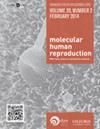多囊卵巢综合征发病机制中颗粒细胞的细胞衰老
IF 3.6
2区 医学
Q2 DEVELOPMENTAL BIOLOGY
引用次数: 0
摘要
多囊卵巢综合征(PCOS)是育龄妇女最常见的内分泌疾病之一,但其病理特征尚未完全确定,最佳治疗策略也仍不明确。细胞衰老是一种永久性的细胞周期停滞状态,可由多种压力诱发。衰老细胞会改变分泌谱,即 "衰老相关分泌表型"(SASP),包括促炎细胞因子,从而导致各种疾病的发病机制。衰老溶解剂是一类选择性消除衰老细胞的药物,目前已被用于临床,达沙替尼和槲皮素(DQ)的组合已被广泛用作衰老溶解剂。我们的目的是研究细胞衰老是否与多囊卵巢综合征的病理有关,以及DQ治疗是否对多囊卵巢综合征患者有益。我们从多囊卵巢综合征患者或非多囊卵巢综合征患者处获取卵巢,并通过注射脱氢表雄酮建立了多囊卵巢综合征小鼠模型。在多囊卵巢综合征患者和多囊卵巢综合征小鼠的卵巢中,衰老标志物 p16INK4a、p21、p53、γH2AX 和衰老相关的 β-半乳糖苷酶(SA-β-gal)以及 SASP 相关因子白细胞介素(IL)-6 的表达均明显高于对照组。为了评估高雄激素和DQ对体外细胞衰老的影响,我们用睾酮刺激培养的人颗粒细胞(GCs),并用DQ处理它们。睾酮增加了衰老标志物和一种 SASP 相关因子的表达,而 DQ 降低了这种增加。DQ 降低了多囊卵巢综合症小鼠卵巢中衰老标志物和一种 SASP 相关因子的表达,并改善了卵巢的形态。这些结果表明,多囊卵巢综合症会导致细胞衰老。高雄激素会导致多囊卵巢综合征的 GC 细胞衰老,而衰老溶解治疗可减少衰老 GC 的积累,并改善高雄激素下的卵巢形态。因此,DQ可能是治疗多囊卵巢综合症的一种新疗法。本文章由计算机程序翻译,如有差异,请以英文原文为准。
Cellular senescence of granulosa cells in the pathogenesis of polycystic ovary syndrome
Polycystic ovary syndrome (PCOS) is one of the most common endocrine disorders in women of reproductive age, but its pathology has not been fully characterized and the optimal treatment strategy remains unclear. Cellular senescence is a permanent state of cell-cycle arrest that can be induced by multiple stresses. Senescent cells contribute to the pathogenesis of various diseases, owing to an alteration in secretory profile, termed ‘senescence-associated secretory phenotype’ (SASP), including with respect to pro-inflammatory cytokines. Senolytics, a class of drugs that selectively eliminate senescent cells, are now being used clinically, and a combination of dasatinib and quercetin (DQ) has been extensively used as a senolytic. We aimed to investigate whether cellular senescence is involved in the pathology of PCOS and whether DQ treatment has beneficial effects in patients with PCOS. We obtained ovaries from patients with or without PCOS, and established a mouse model of PCOS by injecting dehydroepiandrosterone. The expression of the senescence markers p16INK4a, p21, p53, γH2AX, and senescence-associated β-galactosidase (SA-β-gal); and the SASP-related factor interleukin (IL)-6; were significantly higher in the ovaries of patients with PCOS and PCOS mice than in controls. To evaluate the effects of hyperandrogenism and DQ on cellular senescence in vitro, we stimulated cultured human granulosa cells (GCs) with testosterone and treated them with DQ. The expression of markers of senescence and a SASP-related factor was increased by testosterone, and DQ reduced this increase. DQ reduced the expression of markers of senescence and a SASP-related factor in the ovaries of PCOS mice and improved their morphology. These results indicate that cellular senescence occurs in PCOS. Hyperandrogenism causes cellular senescence in GCs in PCOS and senolytic treatment reduces the accumulation of senescent GCs and improves ovarian morphology under hyperandrogenism. Thus, DQ might represent a novel therapy for PCOS.
求助全文
通过发布文献求助,成功后即可免费获取论文全文。
去求助
来源期刊

Molecular human reproduction
生物-发育生物学
CiteScore
8.30
自引率
0.00%
发文量
37
审稿时长
6-12 weeks
期刊介绍:
MHR publishes original research reports, commentaries and reviews on topics in the basic science of reproduction, including: reproductive tract physiology and pathology; gonad function and gametogenesis; fertilization; embryo development; implantation; and pregnancy and parturition. Irrespective of the study subject, research papers should have a mechanistic aspect.
 求助内容:
求助内容: 应助结果提醒方式:
应助结果提醒方式:


